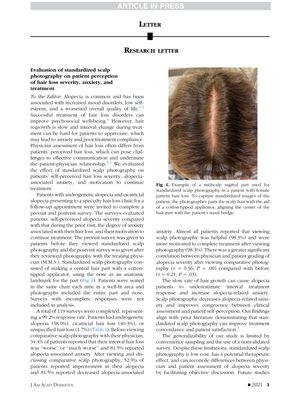Evaluation of Standardized Scalp Photography on Patient Perception of Hair Loss Severity, Anxiety, and Treatment
January 2021
in “
Journal of The American Academy of Dermatology
”

TLDR Scalp photography helps patients feel less anxious about hair loss, agree more with doctors on severity, and stay motivated for treatment.
The study evaluated the impact of standardized scalp photography on patients' perception of their hair loss severity, anxiety related to alopecia, and motivation to continue treatment. A total of 119 patients with androgenetic alopecia or cicatricial alopecia completed surveys before and after viewing their scalp photographs with a physician. Before the photography, 34.4% felt their hair loss was worse since the last visit, and 81.5% experienced anxiety due to alopecia. After reviewing the photographs, 52.9% perceived improvement in their condition, and the same percentage reported decreased anxiety. Additionally, 98.3% found the photography helpful, and the same percentage felt more motivated to continue treatment. The correlation between physician and patient assessments of alopecia severity increased significantly after viewing the photographs. The study suggests that scalp photography can reduce anxiety, improve patient-physician agreement on hair loss severity, and enhance treatment adherence, despite limitations such as convenience sampling and the use of a nonvalidated survey.








